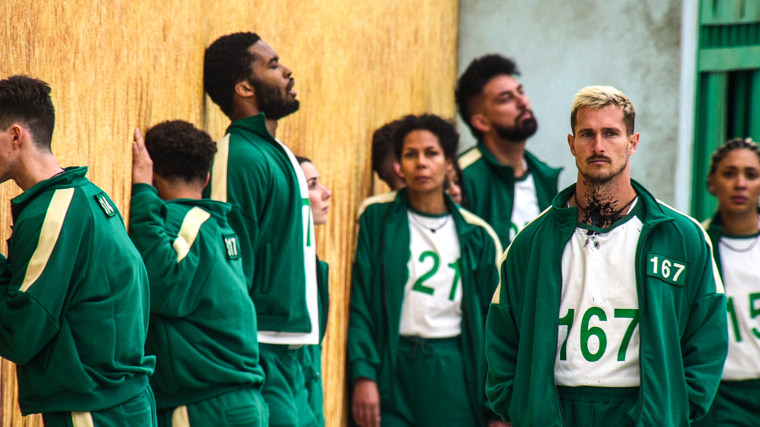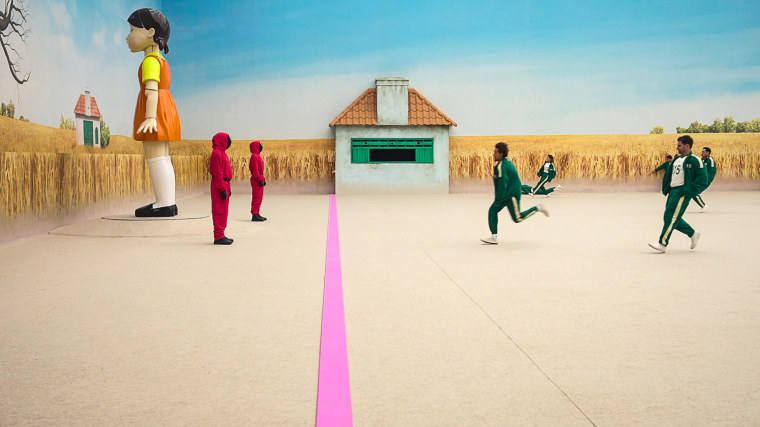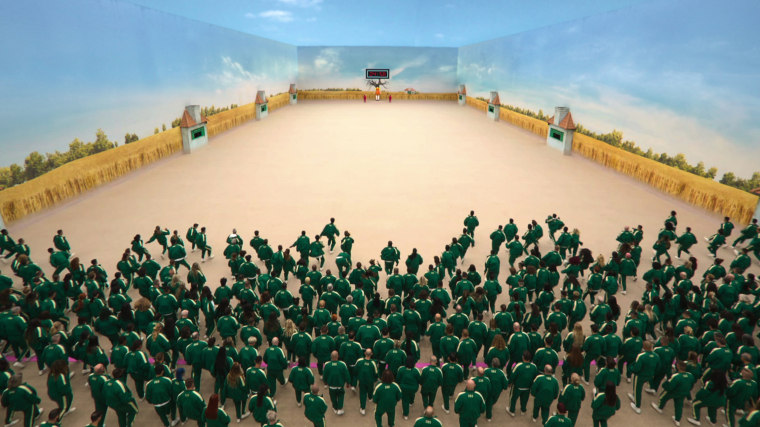When it was first announced, Netflix’s “Squid Game: The Challenge” faced backlash for its premise. Critics online called out the irony of creating a spinoff of the popular South Korean drama, which follows contestants who are burdened with immense debt as they risk death to participate in competitions that involve twisted and violent children’s games.
But on Wednesday, when the competition debuted its first five episodes, the show was met with initial enthusiasm online from many viewers. Some online likened it to other popular competition shows, like the long-running CBS series “Survivor.” Others started posting about how they are already rooting for or against specific players.
While critics have pointed out an irony in the way the reality show capitalizes off of a series rooted in anti-capitalist commentary, some viewers say they just see it as a form of genuine entertainment. Reviewers described it as "downright addicting" and "pretty fun to watch."

“I wasn’t there to just go sit in the corner and hope to win the $4 million,” said Bryton Constantin, 23, known as Player No. 432 on the show, who dropped out of his last semester of college in Clemson, South Carolina, to participate in the games. “I wanted to go have fun. I wanted to enjoy the full experience.” The competition replicates elements of “Squid Game” as closely as possible, from its giant robot “Red Light, Green Light” doll to its winding pastel stairwells. The games themselves, filmed in the United Kingdom, also remain largely the same. The 456 players vying for the chance to win $4.56 million come from around the world, although they all speak English. They span various ages and occupations, including a scuba instructor and a retired newspaper editor. They also all sport track suits similar to those seen in the drama.
The biggest difference is that players in the competition show don’t face death. Netflix noted early on, in announcing the show, that "Win or lose, all players will leave unscathed. But if you win, you win big!” Instead, sometimes a splotch of black squid-like ink spurts out from under competitors' shirts to signal elimination, and other times they’re walked off by masked staff members.
Bence Nanay, who penned an essay for Psychology Today in 2021 titled “Why “Squid Game” Is So Popular,” said there are moral questions to be raised about deep-pocketed powerhouses like Netflix putting a price tag on the opportunity to humiliate hundreds of people for mass entertainment. But the competition doesn’t necessarily make an argument for or against capitalism, Nanay said.
“A lot of people might just do this because they’re superfans,” said Nanay, who is a philosophy professor at the University of Antwerp in Belgium. “There’s a lot of fans that would actually pay a lot of money to be on that set. But it’s a very different kind of concept from when people are just so desperate for that money that they would do anything to get it.”

Viewers are also more likely to be invested in the competition series if they form connections with contestants, according to media psychologist Pamela Rutledge.
“If you can get to know these players, then people are saying, ‘Well, if I relate to that person, how would I behave and what would I do under the circumstances?’” Rutledge, who is a professor emerita at Fielding Graduate University, said. “It gives people a chance to think through those kinds of moral dilemmas.”
Constantin said he did find himself facing moral dilemmas as a contestant. In one episode, he argues with other competitors to choose a shape for his entire line of players in the Dalgona challenge — which would require them to cut a circle, triangle, star or umbrella out of a brittle cookie without cracking the shape. He said that pushed him to put his foot down beyond his comfort zone to get what he wanted.
“You have to just have this feeling inside you of, ‘OK, people are gonna hate you, but at the same time, some people are gonna like you, and you can’t please everybody.’” Constantin said. “I told myself that every day.”

Dani Templet, 24, who also competed in the series, said that the theme of ruthless capitalist competition highlighted in the original “Squid Game” rang true to her own experience in the games.
“Knowing that there was $4.56 million on the line definitely made me more cutthroat in a sense,” said Temple, who was Player No. 134. “When you add that level of [financial] security and you’re competing for that, for whatever reason you’re playing, I think it makes it more real.”
But it wasn’t all about the money for her. “I just really wanted to get out there, travel, meet new people, and just have my life shaken up, in a way,” she said. “I just felt like I was going through the motions of life and I felt like this was a great opportunity to kind of gain some life experience.”
Some competitors, however, reportedly said they faced grueling conditions during production.
Three players received medical attention during the filming of the "Red Light, Green Light" game, Variety reported in January. Production took place during frigid temperatures in the U.K., where the show was filmed. One contestant told Variety that the "conditions were absolutely inhumane." Another was quoted by the publication saying "we were all injured just by going through that experience.
On Thursday, reports surfaced that two unnamed players threatened legal action, claiming they suffered hypothermia and nerve damage while shooting. The letters were reportedly sent to Studio Lambert, the co-producer of the competition show, by Express Solicitors, a U.K.-based law firm.
In a post on its website, Express Solicitors confirmed that contestants asked Daniel Slade, Chief Executive Officer (Legal) at the firm, to "help them seek compensation for injuries they suffered during the show’s filming in January of this year."
“From what we’ve been told they pushed the boundaries of safety in the name of entertainment… Production companies need to ensure that health and safety standards on their shows don’t leave people at risk of harm," Slade said in a statement.
NBC News has not reviewed a copy of the letters. Express Solicitors and Studio Lambert did not immediately respond to request for comment on Thursday.
In a statement to Deadline, Netflix said, “No lawsuit has been filed by any of the Squid Game contestants. We take the welfare of our contestants extremely seriously.” A spokesperson for Netflix declined to comment to NBC News on Thursday.
Some people involved with the project have said they are aware of the backlash surrounding the show itself.

In 2021, YouTube star MrBeast was criticized for having seemingly “missed the point” of the show after creating his own version of the competition, in which 456 players competed to win $456,000. Chrissy Teigen was reprimanded the same year for hosting a “Squid Game”-themed party with celebrity guests dressed as players from the smash hit.
When asked in the Emmys press room in 2022 about the spinoff, “Squid Game” creator Hwang Dong-hyuk didn’t express concern.
“I think that even though our show does carry quite a heavy message — and I know that there are some concerns of taking that message and creating it into a reality show with a cash prize — however, I feel like when you take things too seriously, that’s really not the best way to go for the entertainment industry,” Hwang said at the time.
Tim Harcourt, one of the show’s producers, also defended the competition show’s premise in a recent interview with The Hollywood Reporter.
“I take issue over the notion that ‘Squid Game’ has just one point. One of the important strands was the capitalist critique,” Harcourt said. “But it’s also a critique of how we are ingrained from childhood to be ultra competitive via these childhood games. It’s also about how people behave under pressure — and that’s what makes reality shows interesting.”
The next four episodes will be released on Nov. 29, and the finale drops on Dec. 6.

